Clean Water, Clean Dreams: Supporting Borno's Schools for a Brighter Future
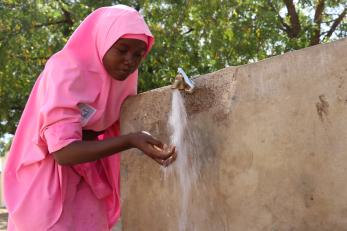
Zara Yakubu, 17, is a young girl from a rural community in Borno State, the epicenter of insurgent activity in Northeast Nigeria, where education has been under attack, with frequent abduction and killing of both staff and students, as well as destruction of educational facilities. The destruction and damage to schools and educational infrastructure have led parents to stop sending their teenage daughters to school due to safety concerns. As a result, there is a significant gender imbalance, with only 30% of female students attending school compared to 70% of male students.
While many parents discourage their female children from going to school for fear of being abducted or killed by insurgents, Zara is one of the girls whose parents discounted their fears and sent her to school to learn. Upon arriving at school, Zara discovered that she would have to spend half of her learning time searching for water, which dashed her dream of a better education. Zara would stay at home on days when she was menstruating because there was no water or convenient sanitation facility at her school. Whenever she decides to stay back at school so as not to miss lectures, she ends up messing up her body with her menstrual flow, which usually results in her being mocked and laughed at by the male students in her class.
“I had only been at school for a week when I began moving around during break periods in search of water and staying home during my monthly circle. It was tough for me to manage my periods in school when there was no water or a decent toilet. This wasn’t the experience I had hoped for when my parents sent me to school; I always felt that staying home would be better,” Zara explained.
With no water, the toilets were home to thousands of germs, slowly making learners sick each day.
Mohammed Tanko Asura, Principal, Government Secondary School
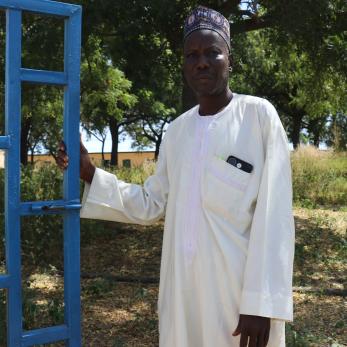
No water and sick students
Operating a school that has existed for more than 39 years with a large population and without water or toilets was a nightmare, according to Mohammed Tanko Asura, the principal of Government Secondary School (GSS), Kwaya Kusar.
“There was no water in the school, and our only borehole was broken. We had a single pit toilet that served the entire school, including the teachers. Boys would relieve themselves in the bushes, and girls would queue at the pit toilet for their turn during their lunch break. They would sometimes miss out on getting a break from class because the queuing took longer than normal break time. With no water, the toilets were home to thousands of germs, slowly making learners sick each day. The school kitchen relied on water from a vendor whose water source we do not know, and each truck cost NGN500,” Mohammed recounts.
Millions of children go to school daily in an unsafe learning environment without drinking water or proper sanitation. In a school like GSS Kwaya Kusar, access to clean and safe drinking water was a distant dream. Before the Small Town Water Sanitation and Hygiene (STWASH) intervention, GSS Kwaya Kusar faced numerous challenges accessing clean drinking water and proper sanitation. Students and teachers relied on contaminated river water, leading to a high prevalence of waterborne diseases. Junior students are often tasked with fetching water from distant locations for senior students. This would occasionally cause them to arrive late to class or even miss classes, which made it difficult for them to concentrate on their education or engage in other productive activities. Additionally, regular fights broke out between students and teachers as they waited for their turn to use the pit toilet.
17-year-old Mercy Isuwa shares her experience after persuading her parents to send her to school despite their objections. She recalls an early experience in school when she witnessed a classmate being rushed home after fainting in school due to a medical condition, and the school did not have any water to revive him. This particular student was required to stay at home for the term. In light of this experience, Mercy began questioning whether she had made the right decision by enrolling in school.
I used to stand at the gate and watch other students as they went to school, and I wished to be like them. I admired them a lot because I love education. Sadly, when I joined, the water challenges in the school almost made me regret my decision.
Mercy Isuwa, Student
GSS Shani, like GSS Kwaya Kusar, is a public school in Borno State with over 2,000 students. Approximately 10 to 15 students at GSS Shani fell ill daily and missed school due to contaminated water. The school faced numerous challenges related to water and sanitation, hindering the students' ability to thrive academically, and endangering their health. Due to the scarcity of clean water sources, students frequently became sick and missed school due to drinking contaminated water. Ibrahim Garga Walama, a teacher at GSS Shani, discusses the impact of clean water and sanitation facilities on the students.
“Before the STWASH intervention, our students' only source of water was the stream water, which is approximately 2 kilometers walk from the school and usually dries up during the dry season. The water from the stream was not clean, animals drank from the same stream, and the students had a habit of openly defecating near the stream; the stream water is a breeding ground for all kinds of bacteria, and students would occasionally become ill from drinking the dirty and contaminated stream water.” Ibrahim said.
The water crisis affected both the students and the teachers who reside within the school compound. When the school faced a total water crisis, teachers would also miss lessons because they did not have water. Additionally, inadequate sanitation facilities posed hygiene risks, affecting the dignity and well-being of students and staff. It was clear that immediate action was needed to address these pressing issues.
“It was so bad that we knew that on a daily basis, about 10 -15 students would be sent home because they had a stomach bug or diarrhea. This weighed heavily on our studies because our classmates were spending less and less time in class. After all, they had been sick and needed medical attention,” Anas Ibrahim Zubairu, an SS2 student at GSS Shani, shares.
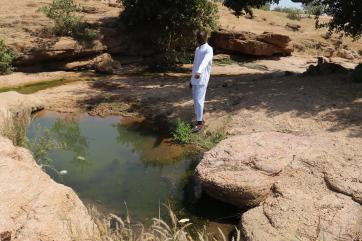
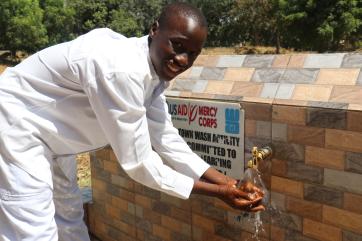
STWASH transforms a community
Recognizing the urgent need for change, the STWASH Activity collaborated with local authorities, community leaders, and the school administration to thoroughly assess the school's water and sanitation needs, ensuring the solutions were tailored to their specific requirements. To address these needs, the STWASH Activity constructed one borehole with a 50 cubic meters capacity tank, rehabilitated one borehole with a 25 cubic meters capacity tank, and constructed three blocks of two-compartment toilets at GSS Kwaya Kusar. STWASH rehabilitated one borehole of a 25 cubic meters capacity tank and made two blocks of two-compartment toilets at GSS Shani. Furthermore, STWASH supported the school in establishing School-Based Hygiene Clubs to educate students and staff about proper hygiene and sanitation practices.
The impact of this initiative has been truly transformative for the school and its students. With access to clean water, the health and well-being of the students have significantly improved. The incidence of waterborne diseases has dramatically reduced, leading to fewer absences and increased classroom attendance. Students can now focus on their studies without illness, enhancing their academic performance and prospects. The provision of improved sanitation facilities has also profoundly impacted the school community. The availability of clean private toilets has improved hygiene standards, promoting a healthier and more dignified environment for students and staff. This has instilled a sense of pride and self-confidence, fostering a positive learning atmosphere.
"The school population has grown from 750 to 1,222 students. We will be eternally grateful to STWASH for the change you have brought to our school; because of the borehole that STWASH constructed for us, we now have clean running water in all our facilities. There is less absenteeism and fewer water-related illnesses, food is always in the school kitchen, students produce better results, and parents are more confident in sending their children to school. Neighboring houses around the school also benefit from the intervention because the water extends to the community," Mohammed expressed gratitude.
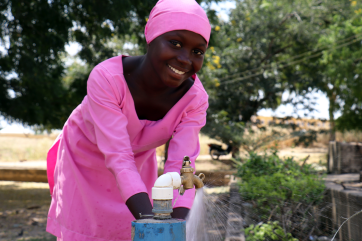
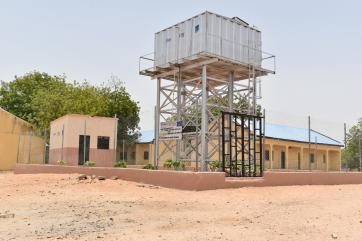
One of the most remarkable outcomes of this report is the sense of resilience that has taken root within the school community. Teachers, parents, and students were actively involved in the planning, implementing, and maintaining the water and sanitation facilities. They formed committees, received training on maintenance and hygiene practices, and took ownership of these essential resources. The project has also sparked a broader community engagement. Parents and community members have recognized the importance of clean water and sanitation for the overall well-being of their children. They actively participate in awareness campaigns and contribute to the ongoing maintenance of the facilities, ensuring their long-term sustainability.
“I no longer have to spend hours looking for water or running home during school hours to wash my menstrual flow. I now have more time to attend school regularly, focus on my studies, and pursue my dreams,” Zara said.
Building a more robust and healthier community, STWASH has proven that access to clean water is not just a dream but a fundamental right that can be realized with dedication and unwavering support. As we celebrate these successes, we recognize the importance of continuing to monitor the water quality to ensure the sustainability of the infrastructure. Furthermore, STWASH remains committed to educating the school community, supporting them to take charge of their health and hygiene. To ensure the sustainability of the water infrastructures, STWASH trained Local Area Mechanics (LAMs) to perform routine maintenance on the facilities. Whenever there is a fault in the facilities, the school management will contact the LAMs to repair minor faults and restore the water supply. The school has also taken steps to hire two security guards to guide the borehole and protect it from theft.
I am extremely grateful to STWASH; a lot has changed since the construction of the borehole and toilet in my school. My dignity as a woman has been restored because I can now practice good sanitation and hygiene. Students and teachers can quickly come out, get clean drinking water, and use the toilets.
Mercy Isuwa, Student